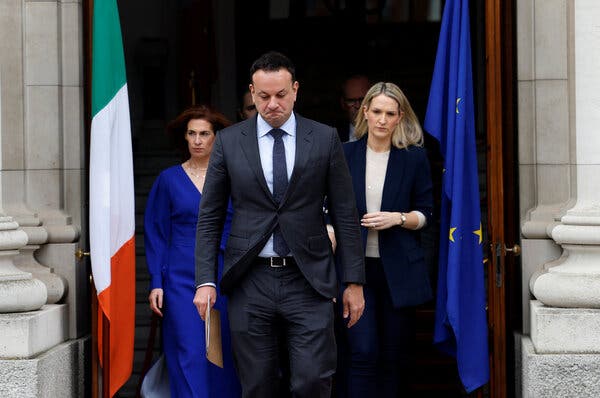Leo Varadkar unexpectedly announced on Wednesday that he is stepping down as Ireland’s prime minister.
Varadkar said the country’s coalition government would have a better chance of re-election under a different leader. On Thursday, Varadkar’s Fine Gael party will begin the process of electing a new leader, with the results to be announced on 5 April. Parliament will vote on Varadkar’s nomination as prime minister after he returns from the Easter recess on 9 April.
The shock departure of Varadkar, who in 2017 became the first gay prime minister in the once-Catholic country and returned as prime minister just 15 months ago, will not trigger a general election. Voting must take place by March 2025.
Varadkar, 45, told a hastily arranged news conference at government buildings in Dublin, sounding emotional as he spoke:
“My reasons for stepping down are both personal and political. But after careful consideration, and some soul searching, I believe that a new Taoiseach (prime minister) and a new leader will be better placed than me to achieve (the coalition government’s re-election).”
His successor will have 12 months to try to win back a significant lead over the main opposition Sinn Fein party, the former political wing of the Irish Republican Army, both Fine Gael and their largest coalition partner Fianna Fail.
Polls show the current three-party coalition also has a chance of re-election, although Fine Gael will have to do without a third of the current lawmakers who have said they will not seek re-election.
Bookmaker Paddy Power has made higher education minister Simon Harris, 37, who was health minister during the COVID-19 pandemic, the clear favourite to succeed Varadkar.
Other contenders include Public Expenditure Minister Paschal Donoho and Justice Minister Helen McEntee. Business Minister Simon Coveney, a former deputy prime minister who lost to Varadkar in the 2017 leadership election, has ruled out running.
In a weighted vote, 54 Fine Gael lawmakers account for 65 per cent of the electorate, meaning a candidate could quickly gain momentum thanks to public support from colleagues. The remaining votes are split between party members and local councillors.
